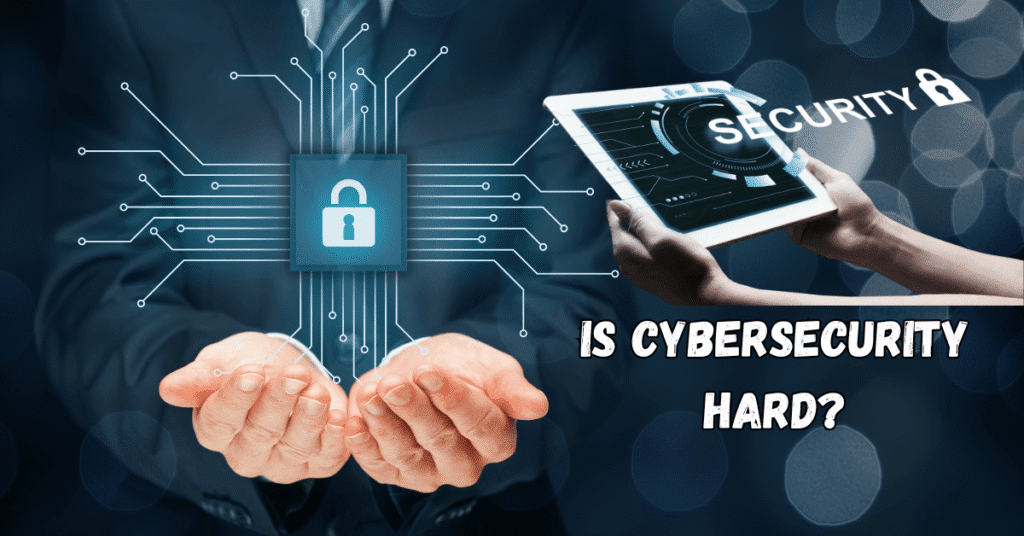So, this became much broader about all conceivable businesses from the cyber world today. Is cybersecurity hard? Probably one more issue on everyone else’s lips about establishing a career in the IT industry that earns their daily bread, seeing the sanctity of their data, or common users that get lost in this cyberspace karaoke.
But that’s not it-thing-somewhat-arresting, whether it’s hard or not, is their not-so-inclination. The correct answer is-“yes-hard, and very paranoid with the rapid development these days.” So, “it requires more skilled hands.”
The article following talks about Cybersecurity matters, under which we will talk about the actual meanings skill-wise that are mandatory for functioning well in the industry, how they are acquired through trade, and why nearly always the return on exertion is worth it either way-it’s just a great study to undertake if you’re thinking about entering or switching into cybersecurity.
Cybersecurity:
Cybersecurity is the science that ensures the safety of systems, networks, and information against an assault in a virtual scenario. Generally, a cyber attack is an act associated with stealing, damaging, or altering data, extorting money from someone, or preventing them from conducting established business operations normally. Careful thought about security comprises concepts guarding against the pretensions to assure related topics, including but not limited to:
- Network Security
- Application Security
- Information Security
- Operational Security
- Disaster Recovery
- End-User Training
That always meant knowing the newest attack vectors, tools, and highly advanced defenses.
What Causes Cybersecurity to Be Fearsome?
There are two aspects- volume theory and real-life aspects- which make it so difficult:
- Theoretically speaking: It is changing very quickly and actively; something new happens every day, or a new vulnerability, or a new threat, and the field has to keep getting ready for turning changes.
- The other aspect: So much information is needed, such as knowing networking, knowing programming, and knowing a little about operating systems here and there, knowing a little about cryptography, ethical hacking, this and that list never ends, and all this is correlating to what it’s like putting together a thousand-piece puzzle-understanding it is hard.
- The stakes: With losses in billions of dollars in data breaches, loss of confidence, financial losses, and damages to reputation, these are high stakes if something goes wrong with cybersecurity.
- Technical: From penetration testing to incident response, you need to gather knowledge on some domains to shine in cybersecurity.
- Regulatory: Now, regulatory requirements happen to be yet another set of complex and hard to grapple with; cybersecurity will have to comply with the GDPR, HIPAA, or even PCI-DSS.
- Whenever it is on-call: The many atrocities of having to live on cybersecurity are another flicker itself. An attack could happen at any time.
- Adversarial: This is the only field in which somebody is challenging you-Randy Marchany, Virginia Tech.
Learning Curve in Cyber Security
You can’t become a knowledge gainer in Cyber Security in one stroke of night; it’s that expensive kind of commitment. However, that’s not enough; it doesn’t quite sound like an impossible undertaking. This would normally appear to be the usual learning path most people tend to follow.
- Beginner Level: Conceptualize IT in basic ways: the operating systems and the networking.
- Middle Level: Exposure to security tools, knowledge of common vulnerabilities, and the ability to detect threats in
- Advanced Level: Be proficient in the following: penetration testing, malware analysis, security architecture, and incident response.
Skills in Cyber Security
Technical skills:
- Networks and Protocols (TCP/IP, DNS, etc.)
- Understand operating systems (Linux, Windows)
- Familiarity with Firewall, IDS, and Antivirus
- Knowledge of programming/scripting (Python, Bash, PowerShell)
Analytical Thinking:
- Pattern of log analysis
- Troubleshooting issues.
- Incident and root cause analysis.
Good Problem Solving:
- Quickly reason under pressure.
- Draft security policies and incident response plans.
Good Communication Skills:
- Informing non-technical stakeholders.
- Clear writing of documents and reports.
Continuous Learning:
- Keep current with threats and countermeasures.
- Invitation to security conferences, webinars, and online communities.
Myths of Cybersecurity
- One has to be a supercomputer genius to excel in cybersecurity: Coding is not without relevance, but most positions do not require advanced high-tech programming skills.
- Now that’s hacking: That has to do with the ethical mantra about hacking, but that’s just a small portion of it. It includes policy writing, risk analyses, training gas, and other things too.
- Only IT folks do cybersecurity: Pretty much everything, from law/yonder psychology right to education, has professionals with cross backgrounds doing cybersecurity.
- Certifications can ensure a job: It is extremely important, but a certification is not granite; there is nothing that says heaven above practical skills and experience.
The newest Cybersecurity pathways
- Foundational: The build begins from a bare minimum of a computer and a network. Learn some of the popular languages utilized by operating systems to communicate data with each other.
- Online Courses: Coursera, Udemy, and Cybrary, among others, present an introductory series of entry-level courses for beginners.
- Certifications: A CompTIA A+ certification would be acquired. At this level, the best entry-level certifications would be Network+ or Security+ as a kickstart to an IT career.
- Home Lab: Set up some VMs and do some mock attacks and defenses.
- Capture The Flag Events: CTF for hands-on practice to solve security challenges.
- Open Source Contribution: Great for the resume; good for the experience.
- Networking In The Community: Cryptic forums to the world of cybersecurity, the city-dwelling meet-ups, and the following guys on social. Career Paths in Cyber Security. You have many careers entwined with skill sets and responsibilities. Cybersecurity has no single identity.
- Security Analyst: Carrying out full standard jobs as performed by security analysts, looking at security issues currently happening within the fields of computing, and examining each system accordingly.
- Penetration Testing(Ethical Hacking): By faking an attack on a system, they will show the vulnerabilities.
- Architects of Security: Build security fixings into systems and networks.
- Incident Responder: Getting enlightened to fight a good fight against cyber threats and breaches.
- Compliance Officer: This refers to a person who checks the necessary compliance factors against other security regulations.
- Forensics Analyst: Those who study the breach occurrence processes and compile evidence of breach through digital means would fall into this category.
Remuneration in Cyber Security:
- Necessity: There is an overall shortage of professionally trained cybersecurity experts worldwide.
- Pay: Funds fly very high over the house of pay for most IT jobs.
- Job Security: Cyber threats have been around a lot longer and stronger than they are today.
- Challenge and Intriguing: Each day, all types of problems differ completely.
- Impactful Work: You will become a protector of not just the individual but also the organizations.
Conclusion
Cybersecurity journey is tough. It requires commitment as well as a thirst for knowledge in thinking like a defender and an attacker. The barriers are strong but not walls. With the right mindset, enough resources, and commitment, an individual can nurture themselves well enough to become a pretty good security consultant.
This is indeed the area where one can hope to enter with the purest of passions, totally committed to technology and problem-solving. This is the field where curiosity, exploration, and tenacity ultimately lead to equal entrepreneurial satisfaction!
FAQs: Is Cybersecurity Hard?
Question 1: Is cybersecurity harder than programming?
Question 1 Answer: Not really; both have their separate difficulties. Some say they love cybersecurity for being more detective work, and others enjoy programming because it involves more logic.
Can I survive with a cybersecurity degree?
Absolutely! The majority will get their education and certification through self-study or experience.
How long does it take to learn cybersecurity?
This depends mostly on the person’s skill and the level of commitment he/she put into it. If done full-time, it might take about 6 -12 months to get ready for an entry-level job.
Do I need to learn coding for cybersecurity?
Yes, it is good to learn a basic script; however, most of the cybersecurity roles are not coding-dependent.
Is it really stressful to work in cybersecurity?
For some, yes, some way or other, depending on the specific jobs and the observation response. Most are considered a challenging but interesting career.
What are the greatest resources to learn cybersecurity?
Many established resources include TryHackMe, Hack the Box, Cybrary, Coursera, and “The Web Application Hacker’s Handbook” book.
Remote cybersecurity jobs:?
Yes, certainly; however, most of these jobs are located in the areas of cybersecurity consulting and compliance. The jobs are scattered throughout the rest of the industry.
What is the future of cybersecurity?
More so as digitalization picks up steam, cybersecurity will grow by leaps and bounds. All in all, demand will be high for some time to come.



